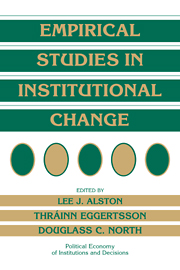Book contents
- Frontmatter
- Contents
- List of contributors
- Series editors' preface
- Acknowledgments
- Introduction
- A note on the economics of institutions
- Empirical work in institutional economics: an overview
- 1 Toward an understanding of property rights
- Economic variables and the development of the law: the case of western mineral rights
- 2 Impediments to institutional change in the former Soviet system
- Why economic reforms fail in the Soviet system: a property rights–based approach
- 3 Transaction costs and economic development
- Public institutions and private transactions: a comparative analysis of the legal and regulatory environment for business transactions in Brazil and Chile
- 4 The evolution of modern institutions of growth
- Constitutions and commitment: the evolution of institutions governing public choice in seventeenth-century England
- 5 Regulation in a dynamic setting
- The political economy of controls: American sugar
- 6 Price controls, property rights, and institutional change
- Roofs or stars: the stated intents and actual effects of a rents ordinance
- 7 Regulating natural resources: the evolution of perverse property rights
- Legally induced technical regress in the Washington salmon fishery
- 8 The politics of institutional change in a representative democracy
- A political theory of the origin of property rights: airport slots
- 9 The economics and politics of institutional change
- Paternalism in agricultural labor contracts in the U.S. South: implications for the growth of the welfare state
- Epilogue: economic performance through time
- Author index
- Subject index
- POLITICAL ECONOMY OF INSTITUTIONS AND DECISIONS
Economic variables and the development of the law: the case of western mineral rights
Published online by Cambridge University Press: 05 June 2012
- Frontmatter
- Contents
- List of contributors
- Series editors' preface
- Acknowledgments
- Introduction
- A note on the economics of institutions
- Empirical work in institutional economics: an overview
- 1 Toward an understanding of property rights
- Economic variables and the development of the law: the case of western mineral rights
- 2 Impediments to institutional change in the former Soviet system
- Why economic reforms fail in the Soviet system: a property rights–based approach
- 3 Transaction costs and economic development
- Public institutions and private transactions: a comparative analysis of the legal and regulatory environment for business transactions in Brazil and Chile
- 4 The evolution of modern institutions of growth
- Constitutions and commitment: the evolution of institutions governing public choice in seventeenth-century England
- 5 Regulation in a dynamic setting
- The political economy of controls: American sugar
- 6 Price controls, property rights, and institutional change
- Roofs or stars: the stated intents and actual effects of a rents ordinance
- 7 Regulating natural resources: the evolution of perverse property rights
- Legally induced technical regress in the Washington salmon fishery
- 8 The politics of institutional change in a representative democracy
- A political theory of the origin of property rights: airport slots
- 9 The economics and politics of institutional change
- Paternalism in agricultural labor contracts in the U.S. South: implications for the growth of the welfare state
- Epilogue: economic performance through time
- Author index
- Subject index
- POLITICAL ECONOMY OF INSTITUTIONS AND DECISIONS
Summary
Much of American legal activity during the eighteenth and nineteenth centuries centered on the transfer of a continent of natural resources – agricultural land, water, timber, mineral deposits – from public to private control. That transfer was crucial for the development of an economic system based largely on private incentives and market transactions. Legal policy at both the state and federal level regarding natural resource ownership and use has been the focus of work by Paul W. Gates, Willard Hurst, Harry Scheiber, and others. Those studies have generally been aimed at describing the nature and impact of governmental support for private economic activities. This paper is concerned with a somewhat different question – the timing and emergence of particular legal institutions (laws and governments). The framework for the study is that offered by Lance Davis and Douglass North in Institutional Change and American Economic Growth. There they hypothesize that institutions develop in response to changing private needs or profit potentials: “It is the possibility of profits that cannot be captured within the existing arrangemental structure that leads to the formation of new (or the mutation of old) institutional arrangements.” Essentially the same model of institutional change is used by some American legal historians, notably Lawrence Friedman and Willard Hurst. They argue that the law can only be understood by examining the surrounding economic, political, and social conditions. Those conditions mold the law, and as they change, they force legal institutions to change.
- Type
- Chapter
- Information
- Empirical Studies in Institutional Change , pp. 34 - 58Publisher: Cambridge University PressPrint publication year: 1996
- 3
- Cited by



